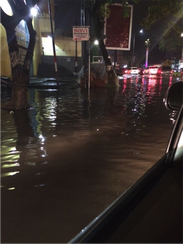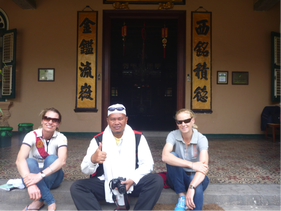
From the air Sumatra seemed divided by rivers. Driving through Medan, it looked as though the city was also. The monsoon had cleared the air of smoke but had also overflowed the gutters and tipped the rivers from their banks.
It was dark by the time we cleared customs. Driving from the airport our taxi driver nosed the cab into a puddle that widened at first into a stream and then into a rush of dirty water that stretched for blocks. Traffic slowed around us and, in the red reflection of tail lights, a diesel slick rainbow. A man with jeans rolled to his knees smiled and waved as he pushed his stalled motorbike through the water while children played and an old man squatted, smoking, watching the flood flow past his house. Our taxi driver adjusted the radio and the water lapped the bottom of the car.
We moved slowly through the flood in first gear, like a dinghy, the tinny sound of the water and the slap of waves beneath our feet. At our hotel we laughingly mentioned the flood and the staff smiled politely, waiting for the joke.
In the morning light Medan looked dirty, the air thick with car horns and a grey humid haze. Our guide, Omar arrived, dressed for a far colder climate – "I'm allergic to air-conditioning," he said apologetically – a large camera around his neck. We began our tour by posing with Omar for the first of many photos. We posed at the post office, the Sultan's residence and on the front steps of a house once owned by a Chinese philanthropist. At a Sikh temple we put on headscarves and posed next to the altar, careful not to turn our backs on the house of god. We visited the university, a high school and a private library owned by a granddaughter of the Sultan.
It was dark by the time we cleared customs. Driving from the airport our taxi driver nosed the cab into a puddle that widened at first into a stream and then into a rush of dirty water that stretched for blocks. Traffic slowed around us and, in the red reflection of tail lights, a diesel slick rainbow. A man with jeans rolled to his knees smiled and waved as he pushed his stalled motorbike through the water while children played and an old man squatted, smoking, watching the flood flow past his house. Our taxi driver adjusted the radio and the water lapped the bottom of the car.
We moved slowly through the flood in first gear, like a dinghy, the tinny sound of the water and the slap of waves beneath our feet. At our hotel we laughingly mentioned the flood and the staff smiled politely, waiting for the joke.
In the morning light Medan looked dirty, the air thick with car horns and a grey humid haze. Our guide, Omar arrived, dressed for a far colder climate – "I'm allergic to air-conditioning," he said apologetically – a large camera around his neck. We began our tour by posing with Omar for the first of many photos. We posed at the post office, the Sultan's residence and on the front steps of a house once owned by a Chinese philanthropist. At a Sikh temple we put on headscarves and posed next to the altar, careful not to turn our backs on the house of god. We visited the university, a high school and a private library owned by a granddaughter of the Sultan.

We visited Medan's Merdeka Square where independence was declared two months later than in the capital because the news took so long to travel. Omar waved his arms at the chain restaurants crowding the outer edge of the square. "The government is always making hanky panky with the people," he said. He walked casually across the road with one hand held up to the oncoming traffic and we huddled behind him, straining to hear over the horns, the motorbikes and the sounds of construction. He talked about the kind of government that sells off parts of an historic monument to fast food franchises and virgin rainforest to overseas companies. "It's all about this," he said sadly and he rubbed his thumb and forefinger together.
In a classroom at the local high school Omar introduced us to the history teacher. "Ask him anything you like," he said. The bell rang for lunch time and girls wearing school-issue hijab filed out the door with phones, ready, in their hands. I asked about the attitude of the local people to the occupying Japanese forces during the war and he said, "Japan is of Asia. They are not a stranger to us." He told us that when the Japanese occupation rode into Sumatra on bicycles the local people mostly welcomed them. I asked him about the Romushas – 120,000 press-ganged Javanese who were brought to Sumatra to work on the railway. "So many of the Romushas died," I said. "Did that change the way the people felt about the Japanese?" He shrugged. "After 350 years, the people of Indonesia wanted independence."
I don't think many tourists spend much time in Medan because everyone we spoke to was interested in why we were touring the city. When I explained that I was researching a novel about Dutch prisoners of war they were enthusiastic though, I think, slightly perplexed as to why I wouldn't be writing about the most important event of the 20th century for Indonesia – independence. But that's the thing about history, it's subjective. No-one I spoke to knew much about the prison camps near Medan or the railway because it's no longer a significant part of their national narrative. It made me think about our own history and how the story of minorities is marginalized, particularly when they don't fit within an agreed upon framework; a framework that reiterates whatever nationalist rhetoric we subscribe to. I think this is also how popular culture works – to a certain extent it silences the minority in order to satisfy a need for simplicity and pander to our inability to accept that the world is both complex and contradictory.
PJ
In a classroom at the local high school Omar introduced us to the history teacher. "Ask him anything you like," he said. The bell rang for lunch time and girls wearing school-issue hijab filed out the door with phones, ready, in their hands. I asked about the attitude of the local people to the occupying Japanese forces during the war and he said, "Japan is of Asia. They are not a stranger to us." He told us that when the Japanese occupation rode into Sumatra on bicycles the local people mostly welcomed them. I asked him about the Romushas – 120,000 press-ganged Javanese who were brought to Sumatra to work on the railway. "So many of the Romushas died," I said. "Did that change the way the people felt about the Japanese?" He shrugged. "After 350 years, the people of Indonesia wanted independence."
I don't think many tourists spend much time in Medan because everyone we spoke to was interested in why we were touring the city. When I explained that I was researching a novel about Dutch prisoners of war they were enthusiastic though, I think, slightly perplexed as to why I wouldn't be writing about the most important event of the 20th century for Indonesia – independence. But that's the thing about history, it's subjective. No-one I spoke to knew much about the prison camps near Medan or the railway because it's no longer a significant part of their national narrative. It made me think about our own history and how the story of minorities is marginalized, particularly when they don't fit within an agreed upon framework; a framework that reiterates whatever nationalist rhetoric we subscribe to. I think this is also how popular culture works – to a certain extent it silences the minority in order to satisfy a need for simplicity and pander to our inability to accept that the world is both complex and contradictory.
PJ

 RSS Feed
RSS Feed
